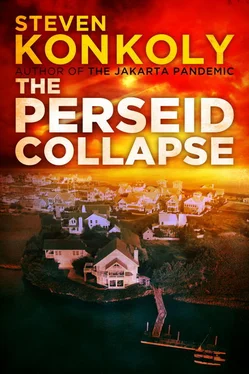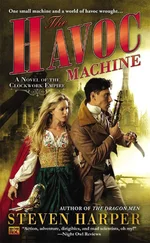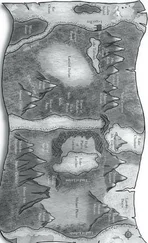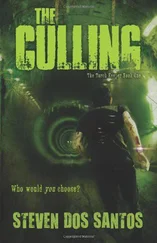“Good morning, Officer. We’re headed to Boston to pick up our kids. My daughter is at Boston College, and his son is at Boston University. We left Scarborough about an hour ago and saw that the York tollbooth was blocked in both directions. We’re looking to take the back roads down into the city,” said Ed.
“Can I see your license and registration? If you don’t mind, gentlemen, I’d like to take a look at your licenses as well,” said the officer, nodding at Alex and Charlie.
The officer examined the Jeep’s registration and their licenses, handing everything back to Ed for redistribution.
“Not a great time to be out on the roads,” said the officer.
“We don’t have much of a choice,” said Ed.
“I suppose not. You should be good to go until you reach the border,” said the officer. “Rumor has it that the locals have shut down all of the crossings. Not sure if that means both ways. Nobody wants a repeat of what happened during the crisis a few years ago.”
Alex didn’t want to drag out their time at the checkpoint, but he needed more information about the general situation.
“Officer, what’s happening at the York tollbooth? It looked like a parking lot,” he asked.
“Maine Guard units have secured the far end of the Piscataqua River Bridge. They’re letting Maine residents or family of residents through for further processing at the tollbooth. They’re being thorough, from what I hear. The governor ordered it,” said the officer.
“I’m surprised they can get past Kittery. We drove through nearly a foot of mud between here and York.”
“Plows cleared a path from York to the bridge for the guard units mobilized out of Sanford. From what we heard, it took them forever.”
Ed asked the officer, “Has anyone heard anything from Boston?”
“Coastal areas from Boston on up were hit hard by tsunami and wind damage. A windblast hit us here, but the damage was mostly superficial. Broken windows and branches on the ground. The tsunami did the real damage. Wiped out everything east of Route 1 in Wells and Ogunquit,” he said and paused before continuing. “People are saying it was a lot worse in Boston.”
“I’m sorry to have brought it up, Officer. I hope your family is safe,” said Alex.
“Thank you. We live west of the turnpike, but a lot of the people we know weren’t so lucky. It’s… uh… I don’t know what to say. I’ve never seen anything like this. How was it up in Portland?”
“The same. We live two miles from Higgins Beach and saw definitive signs of wreckage from the houses in that area. I think anyone living within a half mile of the water is gone,” said Alex.
Officer Jenkins shook his head, fighting to keep his eyes from overflowing with tears. Alex couldn’t imagine the impact a disaster of this magnitude might have on a police officer who patrolled the streets of a small, coastal town. Jenkins probably knew most of the year-round residents by name.
“Any official word on what exactly happened?” Alex asked. “I assume we got hit by an EMP.”
“People report seeing a massive meteorite streak through the sky south of Boston, heading east. They think it hit somewhere out past Cape Cod,” said Jenkins.
“Did they see it hit?” asked Ed.
“Reports are sketchy. Keep in mind that I’m getting most of this information third hand from the York and state police. Apparently there was a massive flash to the east, but nobody they’ve talked to from the cars actually saw the explosion. There’s some talk of fires in Boston and people taken to the hospitals with third-degree burns from the flash.”
“Sounds like the effects of a nuclear detonation. Add the EMP thing—I’m not convinced this is a natural event,” said Alex.
“They think the meteorites or asteroid fragments might have disrupted the ionosphere and caused an EMP. Something like that. Nobody knows shit, basically,” the officer admitted.
“That’s the real problem. Everybody is guessing.” They needed to get moving. “Keep your family safe, Officer. This is going to get a lot worse. You probably know that better than anyone.”
“Yeah. Unfortunately, I know it all too well. I hope you get those kids back,” said the officer.
The police officer moved his volunteers back and pulled his cruiser forward, clearing a path for their Jeep.
“Stay frosty!” yelled Alex from his window, earning a few nods from the roadblock crew. “Take a right up here on 109,” he directed.
“That was easy enough. He barely looked in the car,” said Ed.
“He didn’t care. Our paperwork backed up our story, so he had no real reason to dig any further,” Alex explained.
“I’m glad the two of you had fun. I was shitting my pants back here wondering what our plan might be if that little interaction had gone fucking south for the winter,” said Charlie.
“Our best play is to avoid the police or any kind of checkpoint. If there’s no way around it, like back there, we give them our story, identification, and hope for the best. If the police decide to search the car, we can always flee.”
“With two AR-15s and a shotgun working us over, I don’t think we would have gotten very far,” said Charlie.
“I didn’t get the sense that his crew would have pushed the issue if we had put the Jeep in reverse and left the way we came,” said Alex.
“What about the next crew? What about the group that decides their town needs a four-wheel-drive vehicle more than two dads trying to rescue their Ivy League kids—and I mean nothing by that. Just saying what others might be thinking. We need to come up with a better plan for these checkpoints. This won’t be our last,” said Charlie.
“I’m not drawing down on the police or National Guard. We either flee or surrender to a search if it comes to that,” said Alex.
“What if they start shooting?”
“Then we shoot back. We’re well within our rights to refuse a search and turn around without being shot at,” said Ed.
“I’m with Ed on that one,” said Charlie.
Alex agreed, but he needed Ed and Charlie to come to this decision on their own. He’d already reached this verdict when they turned around at the York tollbooth. The last thing he wanted to do was engage the police in a firefight, but they had every right to defend themselves, especially with so much riding on the success of their journey. Avoidance was their best strategy, but eventually they would find themselves facing another checkpoint—and another. They needed more than a general agreement.
“All right. It sounds like we’re all on the same sheet of music. Let’s game plan more scenarios and establish rules of engagement. We should have done this last night. That’s my bust. I should have known better. I wanted to get a better feel for what we’d be up against out here. We really got lucky back there,” said Alex.
“I was ready to rock and roll if that went the way of the taco,” said Charlie.
They both laughed at his reference.
“There’s more where that came from,” said Charlie.
“I don’t doubt it. Why don’t you chamber a round in both of the ARs and put them on safe. We’ll need every fraction of a second possible if things…”
“Rapidly devolve into a clusterfuck?” Charlie said helpfully.
“Exactly,” said Alex.
EVENT +29:15 Hours
South Berwick, Maine
Alex scanned the road ahead for the inevitable roadblock. They quickly approached the Overlook Golf Course, which marked the edge of town and the most logical place to stop cars headed into South Berwick’s downtown area. He risked a glance at the parking lot, seeing several cars parked in the far corner of the spacious lot. The cars probably belonged to the golfers with the first tee times yesterday morning. He remembered driving through this area during the summer for Biosphere Pharmaceuticals. The Overlook had always teemed with golfers and summer events in the white tent next to the eighteenth green. As they passed the clubhouse and raised barn, Alex saw the tent standing empty next to the green.
Читать дальше












